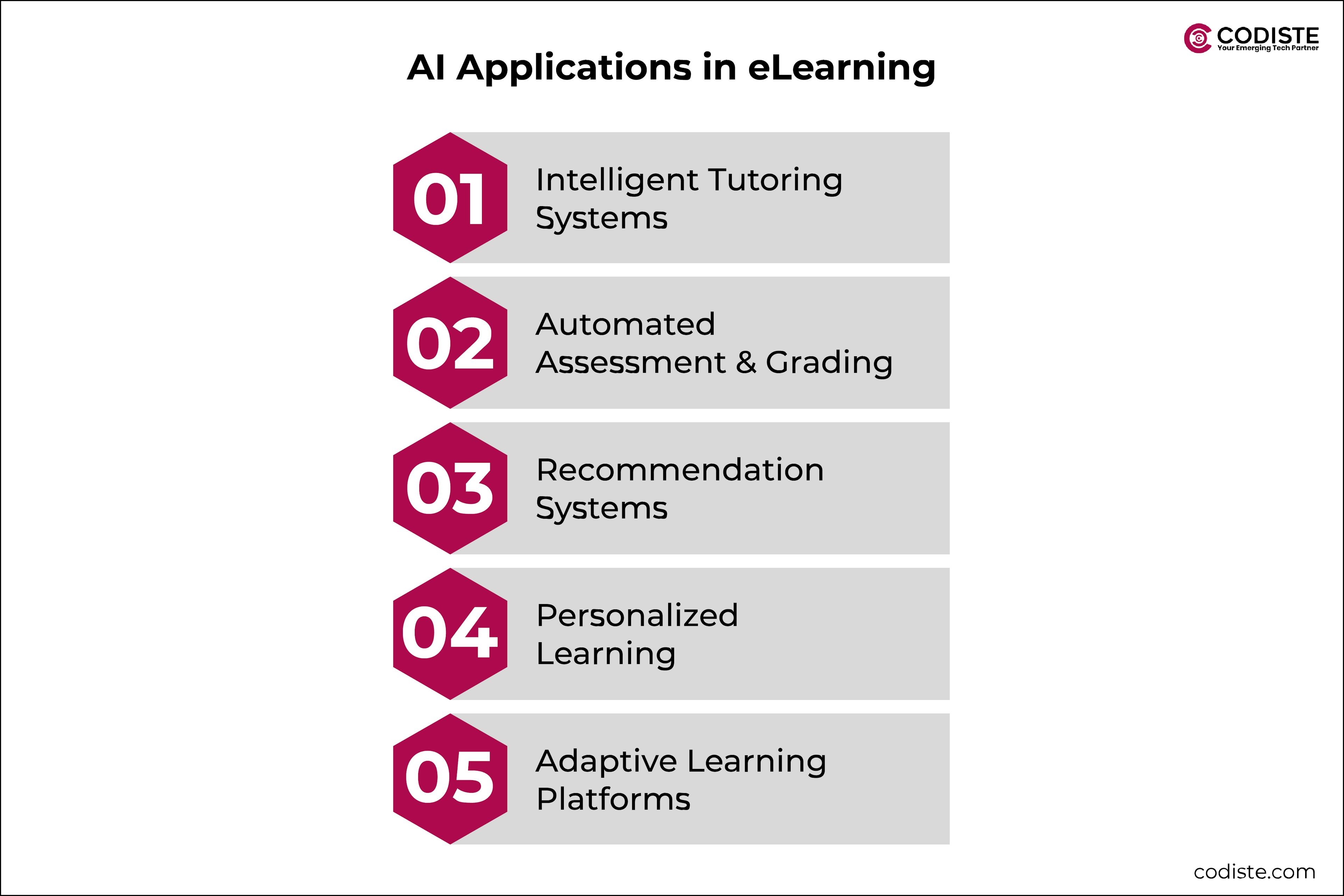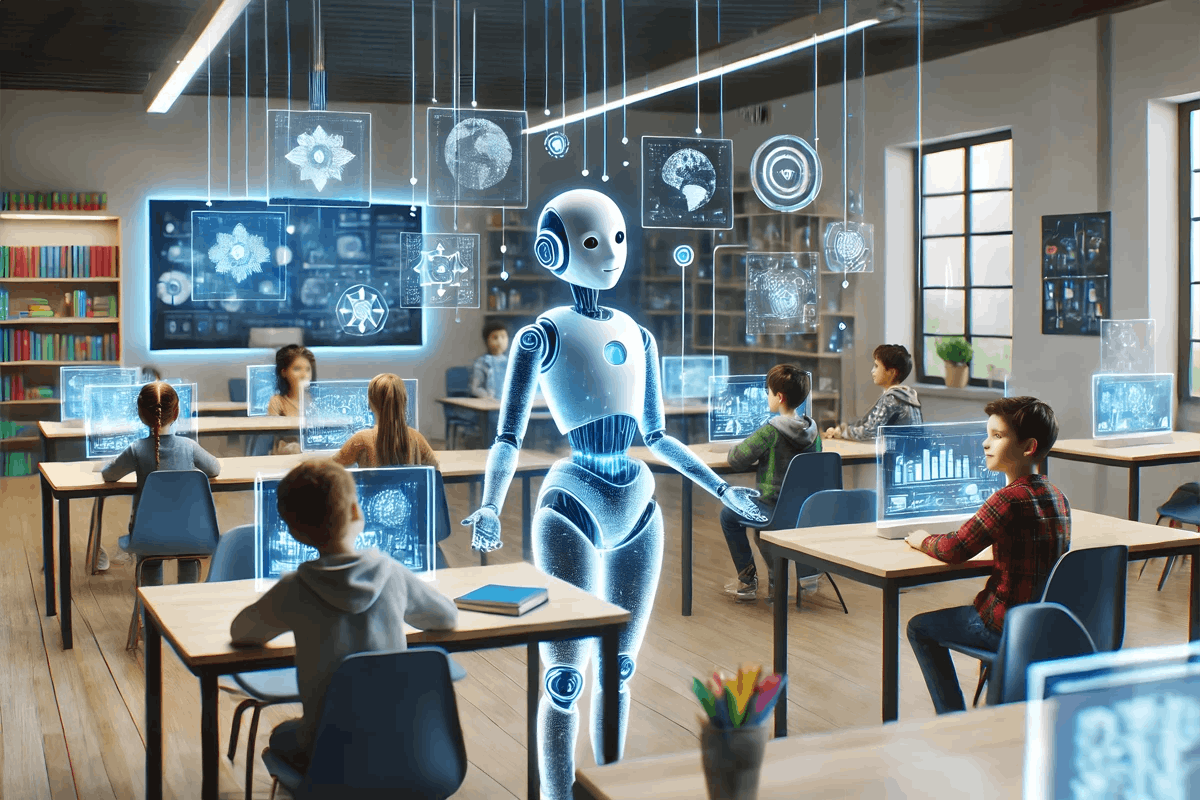
,
Artificial Intelligence (AI) is making a big mark in the current business environment, mainly in education. AI in eLearning is the main driver of changes in the field that are now delivering personalization and efficiency in learning. The effect is going to be huge, as the market for AI in eLearning is expected to reach USD 1.9 billion in 2020 to USD 407 billion by 2027. This fast-growing change in the educational system proves how significant AI is in our lives, and how it is changing the way we traditionally teach and the means of students' learning.
The tremendous rise in the use of Artificial Intelligence in Education is one fundamental reason that contributes to the growing market. The requirement of custom eLearning development services and AI tools are increasingly being used to improve the learning experience in schools across the globe, major businesses, or even individual learners. Now everyone is looking for an innovative AI approach to offering each student a distinct learning path and materials tailored to their exact needs. The use of AI-based learning will enable everyone to access learning materials and concepts in a manner that is more consistent and valuable to them.
One of the most useful ways AI benefits the education sector is behind the scenes, where it works as a silent partner to make everything run more smoothly. There are AI-based tools available for teachers and administrators helping them with their decision-making capabilities. It helps them by simply examining data, creating more personalized learning programs, and maximizing the use of resources. The huge impact of improving education is what constantly widens the AI adoption chart.
AI Applications in eLearning
There is a remarkable growth rate seen in AI in the eLearning market because of its multiple applications. Let us explore how AI improves eLearning experiences through apps:

Intelligent Tutoring Systems
Intelligent Tutoring Systems or ITS can provide the most unique personal learning experiences. ITS can recognize different learning approaches and the advances made by each student individually in the learning process. It also provides continuous feedback to students for the overall improvement in performance. The way that Microsoft uses ITS is a shining example of the use of ITS to engage in personalized learning that fulfills each learner's particular requirements.
Automated Assessment and Grading
In education, grading as well as assessments are important but time-consuming tasks. However, this has changed with the introduction of modern technological advancements whereby AI has developed automated evaluation techniques that can handle these tasks. These systems enable immediate feedback to students thus ensuring a more reliable learning experience. Also, AI in automated student assessments systems give analytical data that can be utilized by teachers to be able to understand the weaknesses of students and help them improve. They also help teachers identify the specific areas in which different students are struggling to include individual guidance. This automation helps enhance the learning experiences of students by explaining correct answers as well.
Recommendation Systems
There is an increasing tendency for eLearning platforms to use something called AI-driven recommendation systems. These intelligent systems analyze the learning patterns of their target users. Based on this, they provide suggestions like informative courses along with resources that would be considered relevant to them. Providing such different personalized learning suggestions and recommendations, they make each student’s learning journey more enjoyable. Particularly, Facebook has shown how powerful this technology has become in creating highly customized training programs for its employees. This kind of learning becomes more practical to diverse audiences for personalized recommendations.
Personalized Learning
Personalized learning has been made possible with the introduction of AI. Some of the advantages of AI are its ability to analyze the data in the education sector and to propose the most refined learning paths for every student involved. This ensures that every learner receives the desired information based on their unique learning style. Amazon is using the power of AI to successfully introduce personalized learning experiences among its employees.
Adaptive Learning Platforms
Adaptive learning platforms use AI to adapt courses according to the progress of a learner. AI-based systems analyze learner’s performance and adapt the difficulty levels and styles of instruction so that the learners are being both challenged and not overwhelmed. Deloitte has integrated adaptive learning into its employee training programs. This helps to personalize the learning experience and ensure efficiency in the process of acquiring new skills.
Modernize the entire eLearning sector with Codiste's technical expertise and experienced team.
Impact of AI in eLearning
In today's world of online education, AI has created a major influence in the field of eLearning. Let us explore some of them:
Personalization
Personalized Learning experience can be easily achieved with AI in eLearning. Artificial Intelligence can collate and analyze learning to create personalized learning experiences. These personalized learning experiences lead to high levels of engagement from the learners. This also leads to efficient learning and achieving the desired learning outcomes.
Image and Speech Recognition
AI-powered image and speech recognition tools have completely changed the interactivity of the eLearning environment. As an example, speech recognition technology can offer real-time feedback on phonetics for language learners. This instant feedback can help students to figure out their areas of improvement. They can also work on their language pronunciation more effectively. Additionally, it can allow learners to replicate the native accents and sounds precisely the way they are meant to be.
Predictive Analytics
AI-driven predictive analysis made it possible to spot patterns, process and analyze huge amounts of data, and improve the whole learning journey. The process analyzes data from the past about the activities of users to predict their future behavior and performance. This is one of the major impacts of AI in eLearning.
Natural Language Processing
Natural Language Processing can provide systems with the capacity to understand human language. NLP also helps to provide interactive, user-friendly, and compatible learning environments that provide customized experiences for learners. Instant help is given to students by the AI chatbots in education in the form of response to inquiries.
Advantages and Challenges
Certain challenges and drawbacks need to be taken into consideration while implementing AI in eLearning. Let us explore each of them:
Benefits of AI in education and training
- Improved Engagement
AI makes the whole learning process more personalized. AI-based eLearning process provides users with relevant and tailored educational material. This creates satisfaction in the minds of learners which helps to improve engagement. - Increased Efficiency
AI can automate many mundane tasks for teachers like grading and content recommendation. This helps the educators to focus on their main task of teaching. AI in language learning helps to improve the overall efficiency of the educational process. - Enhanced Personalized Learning
AI-based eLearning systems can create individualized learning journeys. This custom approach helps to enhance the whole learning process, which can produce better outcomes.
Challenges of AI in education and training
- More Expensive
Sometimes, AI-powered eLearning systems can be more expensive. There are development and maintenance costs associated with the implementation of AI-based eLearning which can be expensive. - Ethical Concerns
Ethical concerns have been one of the many issues organizations or institutions face such as data privacy and bias, when utilizing AI in eLearning.
Conclusion
AI is all set to change the world of learning with the various benefits associated with it. It has the capability to transform the whole eLearning sector. AI-based eLearning allows learners not only to get better learning experiences but also makes the lives of educators easy. This essentially increases the efficiency of the learning process.
If you are looking to develop an AI-based eLearning system, then Codiste, an AI development company in the USA, should be your ideal partner. Codiste is known for its innovative application of AI technology in eLearning management systems. It can create eLearning solutions that are above average with their efficiency and functionality. The deep technical knowledge and experience possessed by Codiste in the use of AI can help you design and implement a modern eLearning system.



How AI-Powered Video Editing Tools Are Revolutionizing Video Translation and Localization
Know more
Top Vulnerabilities in MCP Servers & How FinTechs Can Protect Themselves
Know more
